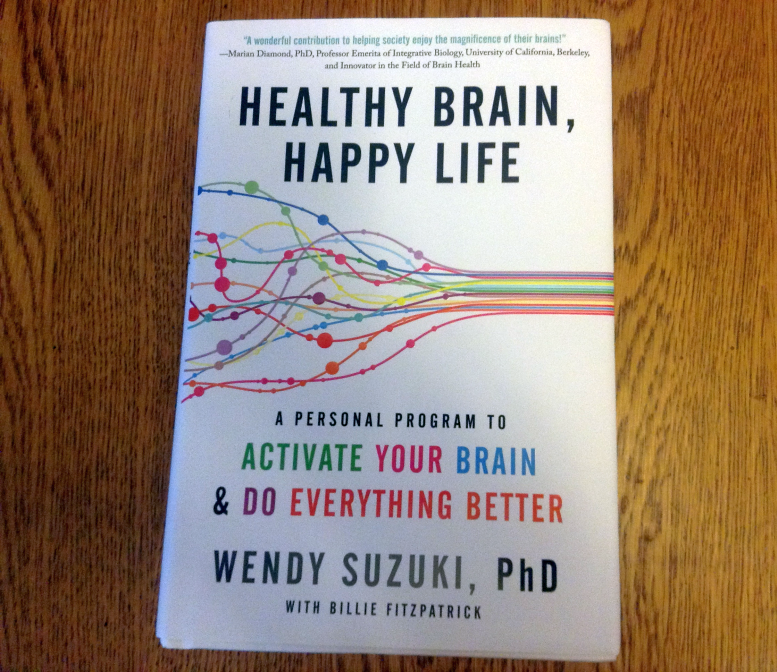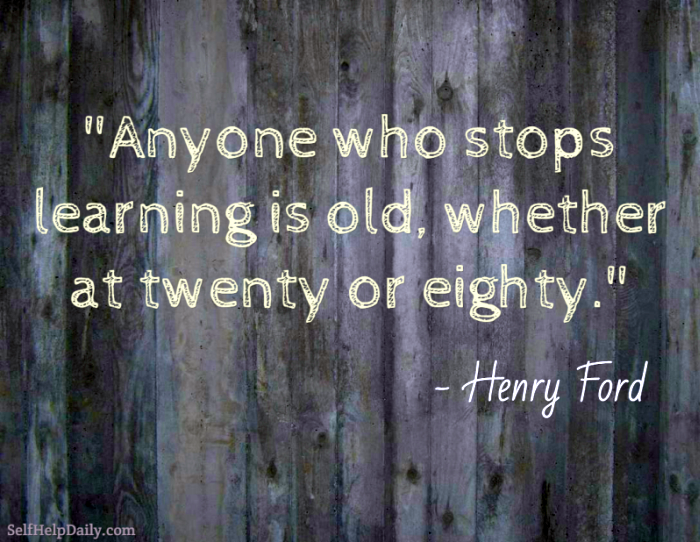
Healthy Brain, Happy Life
I was recently sent a copy of Healthy Brain, Happy Life (pictured above) to review on Self Help Daily. I enjoyed it so much and found it to be so informative and useful that I also wrote a Healthy Brain, Happy Life review on my brain fitness blog.
Healthy Brain, Happy Life is the first book from Wendy Suzuki, PhD – but I hope it’s just the first of many. She writes in such a way that allows her infectious personality to come through each word. This is, undoubtedly, my favorite type of author to read. When an author can inject personality into the prose… that’s where book magic happens.
A neuroscientist transforms the way we think about our brain, our health, and our personal happiness in this clear, informative, and inspiring guide—a blend of personal memoir, science narrative, and immediately useful takeaways that bring the human brain into focus as never before, revealing the powerful connection between exercise, learning, memory, and cognitive abilities.
Nearing forty, Dr. Wendy Suzuki was at the pinnacle of her career. An award-winning university professor and world-renowned neuroscientist, she had tenure, her own successful research lab, prestigious awards, and international renown.
That’s when to celebrate her birthday, she booked an adventure trip that forced her to wake up to a startling reality: despite her professional success, she was overweight, lonely, and tired and knew that her life had to change. Wendy started simply—by going to an exercise class. Eventually, she noticed an improvement in her memory, her energy levels, and her ability to work quickly and move from task to task easily. Not only did Wendy begin to get fit, but she also became sharper, had more energy, and her memory improved. Being a neuroscientist, she wanted to know why.
What she learned transformed her body and her life. Now, it can transform yours.
Wendy discovered that there is a biological connection between exercise, mindfulness, and action. With exercise, your body feels more alive and your brain actually performs better. Yes—you can make yourself smarter. In this fascinating book, Suzuki makes neuroscience easy to understand, interweaving her personal story with groundbreaking research, and offering practical, short exercises—4 minute Brain Hacks—to engage your mind and improve your memory, your ability to learn new skills, and function more efficiently.
Taking us on an amazing journey inside the brain as never before, Suzuki helps us unlock the keys to neuroplasticity that can change our brains, or bodies, and, ultimately, our lives.
Healthy Brain, Happy Life is, obviously, geared toward strengthening the brain, but it goes further than than that. The book shows you how you can take control of your own life, your own mind, your own heart, and your own destiny. Your life isn’t something that happens by chance – you are at the wheel. And guess what, if you don’t like where you’re headed…. you have it in your power to turn!
As someone who is completely fascinated with mental fitness and with improving and strengthening the brain, this book didn’t just speak to me, it yelled. I love the “Brain Hacks” that come with each chapter. They, basically, tell you, “Okay, this is what you’ve learned… this is why it matters… and this is how it can rock your world.”
I also love how clearly the author illustrates how exercise and meditation can improve your brain. Exercise, for example, actually increases the number of new brain cells.
How exciting is that?!
Profound Message Within the Pages
As I said, I love everything about this thought-provoking and eye-opening book. As a book lover, I’m a firm believer that you can get at least one “gem” from any book you read. I’ve even found inspiration in Agatha Christie mysteries. You just have to know where to look, I guess.
While I got a lot from reading Healthy Brain, Happy Life, one of the most profound “take aways” was a small paragraph in one of the early chapters:
The more you bring a memory back to mind, the stronger it becomes…. At the neural level, with each repetition you are strengthening the synaptic connections underlying the memory, allowing it to resist interference from other memories or general degradation. – Page 75
Basically, each time we dwell on something or relive something in our past, we are giving it lasting power. As we grow older, doesn’t it stand to reason that the strongest, most easily “called to mind” memories will be the ones that’ll keep us company?
Hmmm, wonder if that’s why some older people look so miserable?
Since I’ve often been accused of being a “Mary Poppins,” I guess it’s no surprise that I tend to dwell on happy thoughts. I have a darn good knack for shaking unhappy thoughts out of my head. My reasoning is that thoughts are like company you keep and I have zero interest in being in miserable company. Lead me to smiling faces, good times, positive vibes, and happiness – whether they’re in the present or in my memories.
Problem is, a lot of people don’t choose their company quite so carefully. In fact, I’ve known plenty of people who “call up” negative memories more often than most people call their mother. Deep down, beneath the umbrella, my inner Mary Poppins always knew this was an unhealthy way for them to live. However, until reading the words on page 75, I never realized just how harmful it was to dwell on negative memories.
The more you bring a memory back to mind, the stronger it becomes….
I want to strengthen my good memories, how about you?! As for the bad ones, let’s vow to push them so far out of our minds that a GPS couldn’t help them find their way back.
Front to back, Healthy Brain, Happy Life is a wonderful read. The author brings personality and even “fun” to a very important subject.
You can improve your mind while improving your world and I just told you all about a book that can help you take the next step.
From the Back Cover
The key to a happy life . . . is a healthy brain
From the outside, it looked like Dr. Wendy Suzuki had it all. She was a world-renowned neuroscientist. She had been lauded by her peers with many prizes and had produced many highly regarded scientific publications. She had tenure at a top-ranked university, where she also ran her own lab—two of the most difficult and highly coveted positions for any scientist to attain. And yet . . .
Wendy was forty, frumpy, and focused on her work one hundred percent of the time. She was single, overwhelmed by her responsibilities, and often found herself in uncomfortable, strained interactions with everyone around her. To put it simply, Wendy Suzuki needed to change her life.
She set out on a journey that would transform her body, her mind, and her brain. The first step was exercise and creating a regime that would make her body more fit. In the process, Wendy found herself focusing better, working smarter, and getting more accomplished in a shorter amount of time. As her body changed, her determination grew. Wendy set out to build a more vibrant social life, spark her creativity, and engage in meditation and other mindful activities—using her expertise in neuroscience to pinpoint exactly how these actions not only made her brain work better but also made her feel, well, happy. In Healthy Brain, Happy Life, Wendy Suzuki makes the ultimate mind-body-spirit connection and shows that everything she did for her body changed her brain—and her life—for the better.
Healthy Brain, Happy Life is an accessible blend of memoir and science narrative that will transform the way you think about your brain, your health, and your personal happiness. Through both groundbreaking brain research and personal stories, Wendy offers practical and fascinating ways to improve memory, engage the mind more deeply, and learn new skills that will ultimately transform your body and your life.
About the Author
Wendy Suzuki, PhD, runs an interactive research lab at New York University, where her work has been recognized with numerous awards including the prestigious Troland Research Award from the National Academy of Sciences. She is a two-time TEDx speaker and is regularly interviewed in the media. She lectures nationally and internationally on her research and serves as a reviewer for many of the top neuroscience journals. She lives in New York City.
Billie Fitzpatrick has coauthored numerous books, including several New York Times bestsellers. She specializes in mind-body health, neuroscience, nutrition, and diet and fitness.
Read more about Healthy Brain, Happy Life on Amazon.
Keep those thoughts positive! ~ Joi



